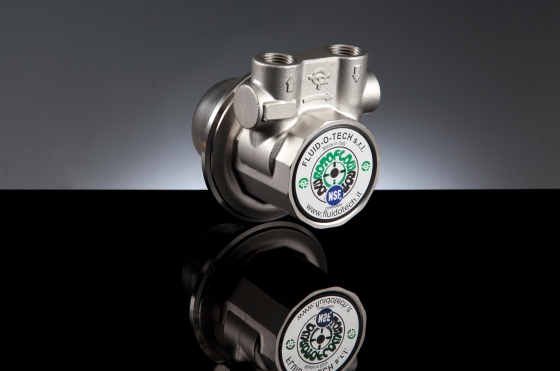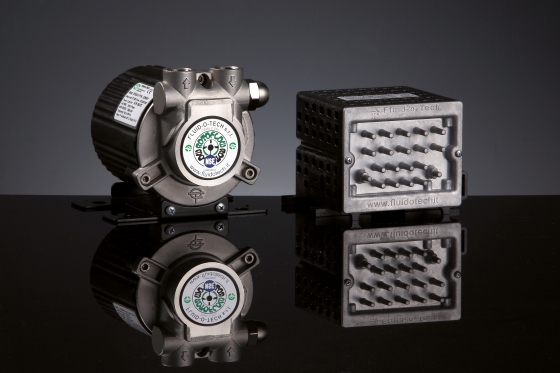This article aims to describe the main features of the vane pump technology, how it works, its advantages and disadvantages, and where it is most commonly used. Finally, we will briefly mention the Fluid-o-Tech vane pumps.
Below is a brief summary of the contents:
• Components of a rotary vane pump
• Advantages and disadvantages of the rotary vane pumps
• A wide range of rotary vane pumps
A rotary vane pump is a type of positive displacement pump. Like all positive displacement pumps, the flow rate is always directly proportional to the speed.
Vane pumps are available with different types of vane: sliding, flexible, oscillating, rotating, and external vanes. The vane pumps are known for their dry-priming, easy maintenance, and good suction characteristics throughout the life of the pump.
Despite the different configurations, most vane pumps operate according to the same general principle.
A splined rotor is supported eccentrically in a cycloidal cam. The rotor sits close to the cam wall to form a crescent-shaped cavity. The rotor is sealed in the cam by two side plates. The vanes or blades fit into the rotor cavities. When the rotor rotates and fluid enters the pump, the centrifugal force, the hydraulic pressure, and/or the pushrods push the vanes towards the housing walls. The tight seal between the vanes, the rotor, the cam, and the side plate makes this technology powerful for good suction, which is common to the vane pumping principle.
The housing and cam force the fluid into the pumping chamber through holes in the cam (small red arrow on the bottom of the pump). The fluid enters the pockets created by the vanes, the rotor, the cam, and the side plate.
As the rotor continues to spin, the vanes sweep the fluid to the opposite side of the crescent where it is squeezed through the cam discharge holes as the vane approaches the point of the crescent. The fluid then exits through the discharge port.
In addition, this technology is available with both direct and magnet drive. This latter option removes the shaft seal by introducing a magnetic coupling.

When it comes to choosing components for a rotary vane pump, it's essential to consider various factors to ensure optimal performance and longevity. Rotary vane pumps are widely used in different industries due to their efficient and reliable operation. The main components of a rotary vane pump include the:
• vanes
• rotor
• stator
• housing
The vanes play a crucial role in creating the necessary vacuum or pressure by sliding against the stator walls. The rotor, driven by an external power source, rotates inside the housing, generating the pumping action.
Choosing high-quality materials for these components is vital to minimize wear and maximize efficiency. Additionally, regular maintenance and lubrication are crucial to keep the pump running smoothly. This is precisely why Fluid-o-Tech invests in components that offer durability and precision design, with the ultimate goal of optimum performance.
The rotary vane pump is very versatile and can be used in a variety of sectors and applications, from dosing to transferring and repressurizing fluids. Depending on the choice of materials, rotary vane pumps can handle a wide range of clean fluids.
Advantages of rotary vane pumps:
• Delivery of a stable, low-pulsation flow rate
• Capable of generating a high differential pressure
• Operate in both directions of rotation
• Compensate for wear through vane extension
• Self-priming design
• Low noise and vibration levels
Disadvantages of rotary vane pumps:
• Not suitable for high pressures
• Not suitable for viscous fluids
• Not suitable for abrasive fluids

Fluid-o-Tech is able to supply a wide range of rotary vane pumps covering a variety of applications in different sectors. In stainless steel, low-lead brass, technopolymer, direct coupled, magnetic or electromagnetic drive at variable speed, our pumps cover a flow rate range from 30 to 2200 l/h at pressures up to 18 bar. The built-in safety valve, available on request, limits the pressure to protect the pump and the hydraulic circuit.
The Fluid-o-Tech rotary vane pumps, WRAS or NSF certified for use with potable water, are the reference choice in the market of espresso machines and beverage dispensers for professional use.
Read also: Espresso pumps
Fluidotech offers a wide range of rotary vane pumps according to the material used ( pps technopolymer or metal body) and according to the range of flow rates and type of drive (direct or magnetic).
There are 8 models in our catalog and they are divided into:
• PO 4000 series
• PO 500 - 1000 Series
• PO 70 - 400 Series
• CO-MO Series 50 - 200
• GA series - the smallest
• TH Series 500 - 1000
• TM Series 300 - 400
• TM 30 - 200 Series
We also make 4 models of motor/pump units that go with our rotary vane pump models. Specifically we are talking about:
• TMCF01-07S series motor pump units
• TMFR-30-200 series motor pump units
• TSFR 300-400 series motor pump units
• HA series motor pump units
Find here all rotary vane pump models in the catalog made by Fluidotech. If you can't find what you're looking for in the catalog, we can make rotary vane pumps on request according to our customers' requirements.
For further information please fill out the form below
For any information feel free to contact us and a Fluid-o-Tech representative will contact you
CONTACT